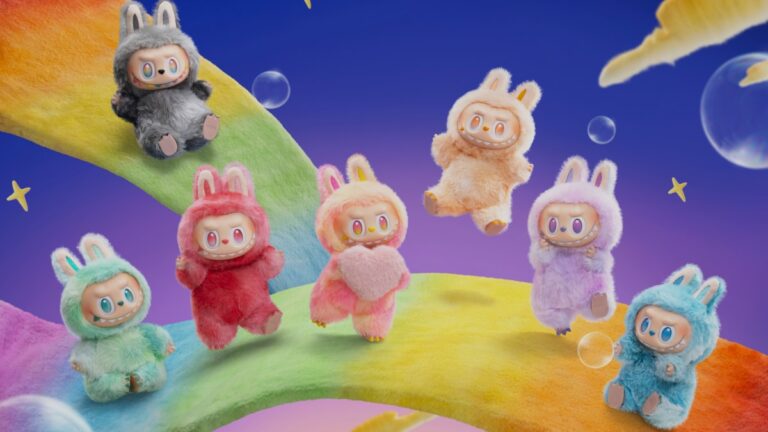“They’re demonic.”
That was the warning from the podcaster Adelle Nazarian, who recently joined a chorus of social media commentators alerting the world to a new “satanic” trend. But the target of her concern was not a secretive cult that worships the devil. It was a cuddly toy called the Labubu.
For those who haven’t heard, the Labubu is a collectable monster plushy that has become a global monster hit. Manufactured by the Chinese company Pop Mart, these grimacing dolls can be found dangling from a bag on any subway car in New York, affixed to everything from a little girl’s backpack to a second wife’s Birkin.
EDWARD BERTHELOT/GETTY IMAGES
With saucer-like eyes, pointed teeth and ultra-wide smirks, they are sold in “blind boxes” from $27.99 (up $6 from before Trump slapped tariffs on China).
Part of the fiendish fun is the lottery of it all: rare versions, known as “secrets”, are resold on eBay for hundreds of dollars. Some 300 varieties have been released, with sales rocketing in recent months.
There are 2.2 million TikToks using the hashtag Labubu, and Pop Mart raked in $423 million last year from the dolls alone, up 729 per cent from 2023. Last month, a mint green 4ft version fetched $150,000 at auction in Beijing. And already this summer New York has been subjected to a Labubu fashion show, a Labubu rave, Labubu Pride and a “Labubu ice cream social”.
Now, for some God-fearing folk, these tiny dolls are the “agents of Satan”. Last week an army of Venezuelan mothers protested against the toys, brandishing signs calling them “spawn of Lucifer” and “Beelzebub”. Nazarian, for her part, said the Labubu was “inspired by a real and terrifying Mesapotamian entity — Pazuzu”.
Are they satanic? Probably not. But they definitely are evil.
What those Venezuelan mothers see in the frenzied eyes of their children, who claw at them to buy overpriced, overhyped tat, is a form of idolatry. And it’s not just kids. Adult women my age are just as keen — if not more — to queue for hours outside Pop Mart to score a Labubu, or spend hundreds on “hauls” of toys to get their hands on a rare edition.
PEDRO PARDO/AFP/GETTY IMAGES
On TikTok, one such grown-up boasts how she “spends her big girl money” on a remote-controlled miniature scooter to ferry her dolls around. In another post, a real plastic surgeon performs a “Labubu BBL”, turning the toy over to reveal a pert, fluffy behind.
This craze is a kind of worship — for the false gods of fast fashion. And for Labubu’s Gen Z fans, this carries the sulphurous reek of hypocrisy. My age group, after all, professes to be concerned about the environment, wringing our hands over plastic junk doomed for landfill. We furrow our brows over mass-produced debris flowing out of Chinese factories, and yet snap up toys flown to the West on emissions-belching planes in the name of fleeting “microtrends”.
For a generation that has taken the oath of environmentalism, seduction by Pop Mart is a form of blasphemy.
But the truly great heresy for Labubu lovers? They’re lame. After all, how can an ugly, fluffy keyring be an original “statement” when every other fast-fashionista has one?
Even I, a devout atheist, felt I had seen the devil when a sickly treat appeared in a Florida café, blending two Gen Z fads into one — a Labubu milkshake made with Dubai chocolate:
Truly, this is the work of Labubucifer.
I excuse the children — they know not what they do. But we grown women should know better than to infantilise ourselves by collecting toys of any stripes, whether they be mounds of “Jellycat teddies” or “Sylvanian Families” (known in the US as Calico Critters).
The Labubu practises dark magic. He makes common sense disappear, levitates our wallets, vanishes our cash. He stares down mates, dates and colleagues, telepathically communicating the message: “Fear me, for I bring doom, poverty and microplastic pollution. And I will ruin your outfit.”
To those thinking of straying to the dark side, the power of taste compels you to see the light. In 2025, the devil does not wear Prada — he wears Pop Mart.






